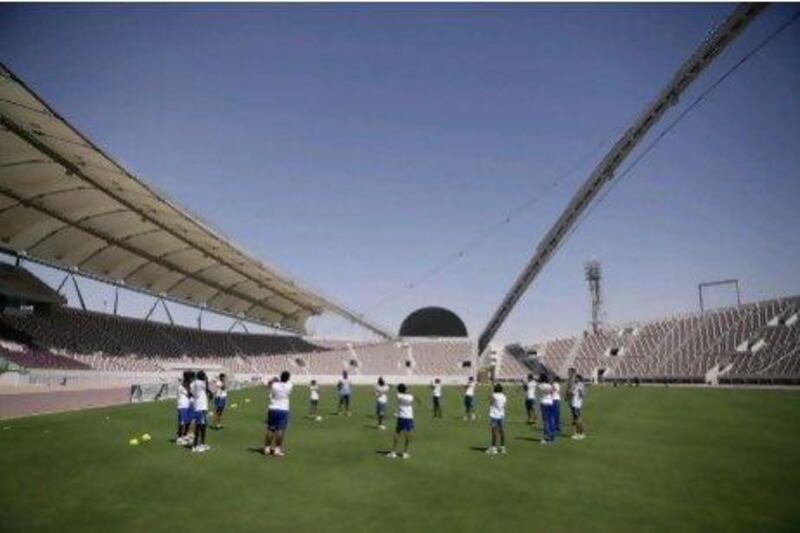When Qatar won the right last December to host the 2022 Fifa World Cup, few doubted it had the wealth to develop its sporting capacities, but many were moved to wonder why it had bid.
Video:World Cup 2022
Qatar has ambition designs for its World Cup stadiums.
Questions were raised about the suitability of the country's desert climate, the lack of Qatari competitors and its sporting traditions. Not at all deterred, Qatar last month announced its candidacy for the 2020 Summer Olympics.
The bids are an attempt to put the tiny Gulf emirate on the map, says a spokesman for the Qatar Olympic Committee.
"The value of the sport isn't only to win a medal or win first place in an event," he says. "Sport is one strategic tool we use to promote Qatar."
It is also a way of encouraging Qataris to take up a more active lifestyle.
The world's fastest-growing economy has realised it can afford to dream big.
This week, Doha was fluttering with flags promoting the city's bid to host the 2017 World Championships in Athletics. It is competing against London.
As for the practicalities, the organisers see few obstacles. To avoid the September heat during the Olympic marathon, for example, the event will be held at night - if Qatar's bid is successful.
Air-conditioned stadiums, already seen as a solution to hosting football matches in the summer of 2022, may even produce superior track times to those held in natural climates, say officials at Aspetar, the Qatar Orthopaedic and Sports Medicine Hospital, which gleams opposite Doha's newest stadiums.
The country's population is expected to balloon from 1.4 million to about 3 million by the time of the 2022 football tournament, as new companies and labour is shipped in to meet construction and infrastructure needs.
The US$100 billion (Dh367bn) investment planned for 2022 will also stimulate the economy throughout the decade even after the growth rate, currently accelerating at a rate of 41.8 per cent, has settled down to a more manageable level.
Qatar faces little difficulty in attracting companies and people to develop its economy. But what about sports fans to fill the new stadiums? It could be done, says Lars Haue-Pedersen, the managing director of TSE Consulting, a Swiss company that is advising Qatar on its bid to host the athletics championships.
"Why can't you have 5,000 people from Kenya coming here? You can afford it." he says. "They've never received the opportunity before."
Though many of the spectators for Qatar's games will be expatriates and nationals based in Doha, plans are under way to coordinate the athletics tournament with the country's hotel industry and its flag carrier airline, Qatar Airways.
But even though a large proportion of the seating in the country's stadiums, courts and running tracks will be reserved for Qatari nationals, attendance at sporting events remains a concern.
During the AFC Asian Cup in January, match attendance at the football games averaged about 12,000, according to statistics from ESPN.
Furthermore there are concerns at the country's ability to handle thousands of spectators - Qatar faced widespread negative publicity when thousands of ticket-holding fans were turned away from the final at Khalifa Stadium as police imposed a lockout ahead of Japan's win over Australia.
The athletics tournaments that Qatar is bidding for, with the exception of the Summer Olympics, also tend to attract smaller crowds than other sports.
Fifa went as far as to warn in its evaluation report for Qatar's winning World Cup bid that low match attendance numbers might challenge the sporting body's traditional business model during the tournament.
But the Qatari government is determined to change the sedentary habits of its population through sporting events and placing greater importance on athletic prowess.
"Part of the [Qatar] 2030 Vision is that they want to build a healthy nation - healthy meaning physically and mentally - and sport plays a very important role," says Mr Haue-Pedersen.
Despite its vast wealth, some economists remain sceptical that Qatar could make a serious bid for the Olympic Games. But putting together a bid that is ultimately unsuccessful could still have advantages for Qatar, says Jarmo Kotilaine, the chief economist at Saudi Arabia's National Commercial Bank.
"I suspect this is much more of an effort to show they're serious about this sort of thing and they're committed to further heightening their profile," he says.
Though some of the smaller tournaments could be bid for without much additional expenditure, the costs of hosting the Olympic Games are much larger, says Mr Kotilaine.
"It could be a bit of a fiscal stretch."





